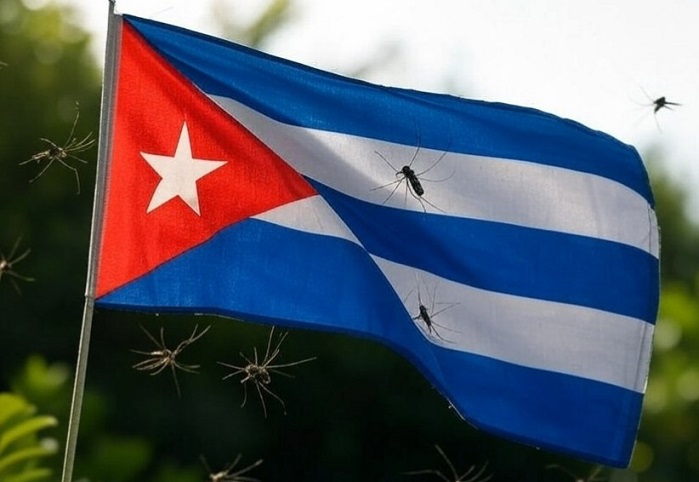Nikhil Prasad Fact checked by:Thailand Medical News Team Feb 10, 2025 2 months, 1 week, 1 day, 6 hours, 23 minutes ago
Medical News: Alarming Increase in Oropouche Fever Cases Across Cuba
Cuba is currently experiencing a surge in Oropouche fever cases, marking one of the most significant outbreaks in recent history. This mosquito-borne illness, previously rare in the region, has rapidly spread across all of Cuba’s provinces, causing growing concern among health officials and the general public.
 Cuba Faces Rising Oropouche Cases and Guillain Barre Syndrome Concerns
Cuba Faces Rising Oropouche Cases and Guillain Barre Syndrome Concerns
The Pan American Health Organization (PAHO) released a report on January 30, 2025, detailing the scale of the outbreak. Dr. José Raúl de Armas, head of the Department of Communicable Diseases at Cuba’s Ministry of Public Health (MINSAP), provided critical insights into the situation. As of now, a staggering 23,639 suspected cases have been reported, with 626 cases confirmed through laboratory testing.
https://www.paho.org/es/noticias/30-1-2025-sesion-virtual-para-conocer-sobre-respuesta-al-oropouche-cuba
Among these confirmed cases, 76 patients have developed Guillain-Barré Syndrome, a severe neurological disorder. Additionally, 25 individuals have been diagnosed with encephalitis, and 15 others with meningoencephalitis, both of which can lead to life-threatening complications.
This
Medical News report highlights the growing concerns surrounding the outbreak and the measures being taken to control it.
Transmission and Symptoms of Oropouche Fever
Oropouche fever is caused by the Oropouche virus, which is primarily transmitted through the bites of infected midges and mosquitoes. According to the U.S. Centers for Disease Control and Prevention (CDC), the illness typically incubates for three to ten days before symptoms appear. Those infected often experience fever, headaches, muscle pain, joint pain, nausea, and general fatigue. The symptoms usually last between three and six days, and most patients recover without long-term effects. However, the increasing number of Guillain-Barré Syndrome cases linked to the outbreak is raising serious concerns among health professionals.
Unfortunately, there is currently no specific treatment or vaccine for Oropouche fever. The CDC has issued travel health advisories for several countries in the Americas, including Cuba, to warn international visitors of the ongoing health risks. With no preventive vaccines available in 2025, health experts are urging residents and travelers to take precautions against mosquito bites.
Efforts to Control the Outbreak and Prevent Further Spread
Cuban health authorities have ramped up efforts to contain the outbreak. The government has focused on enhancing waste collection and improving sanitation in key urban centers, especially Havana, where mosquito-borne diseases are more prevalent. Efforts have also been directed at increasing public awareness about the importance of personal hy
giene, safe food handling, and water sanitation.
Local health officials are actively monitoring and managing outbreaks in four provinces, four municipalities, and four health districts. They have implemented vector control measures, including fumigation and the elimination of mosquito breeding grounds. Despite these interventions, authorities remain cautious, particularly with the approaching rainy season, which coincides with Cuba’s summer months. The combination of warm temperatures and increased rainfall creates ideal conditions for mosquito populations to thrive, potentially worsening the outbreak.
Previous Epidemic Challenges in Cuba
This is not the first time Cuba has faced a widespread health crisis. In 2024, the country battled multiple epidemiological challenges, including a spike in Hepatitis A cases and a surge in dengue infections. The emergence of Oropouche fever has added another layer of complexity to Cuba’s ongoing efforts to control infectious diseases. Public health officials are urging residents to seek medical attention at the first sign of symptoms and to avoid self-medicating without professional guidance.
Conclusion
The rapid spread of Oropouche fever in Cuba is a pressing public health issue that requires immediate and sustained efforts to contain. While most cases result in mild symptoms, the alarming number of Guillain-Barré Syndrome and encephalitis cases linked to the virus is a cause for concern. The lack of a vaccine and specific treatment makes prevention the primary line of defense. With the rainy season approaching, authorities are emphasizing the need for stringent mosquito control measures to prevent further escalation of the outbreak. Residents and travelers must remain vigilant and take necessary precautions to protect themselves and their communities.
For the latest on the Oropouche Outbreak in Cuba, keep on logging to Thailand
Medical News.
Read Also:
https://www.thailandmedical.news/news/study-validates-that-it-s-a-new-strain-of-oropouche-virus-that-is-wreaking-havoc-across-brazil-and-soon-globally
https://www.thailandmedical.news/news/breaking-oropouche-virus-makes-a-resurgence-22-cases-in-bolivia-possibly-behind-rise-in-unexplained-fevers-and-platelet-dips-in-india
https://www.thailandmedical.news/news/impact-of-covid-19-on-the-evolution-of-other-viruses
